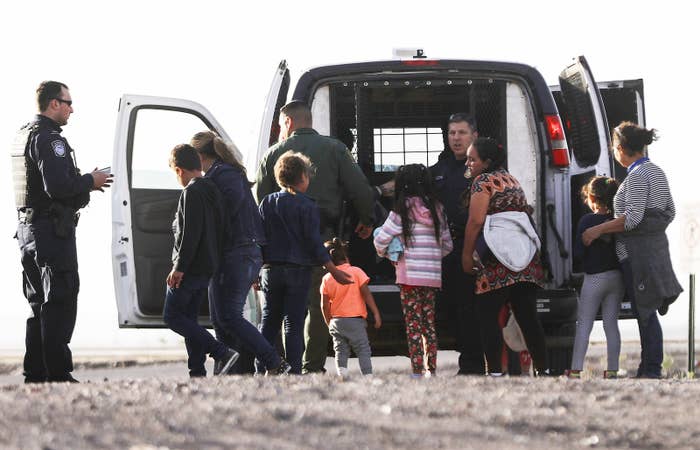
WASHINGTON — The American Civil Liberties Union is accusing the Trump administration of wrongfully separating families over the past year at the US–Mexico border for unjustified reasons, such as a parent’s “minor” criminal history or “dubious” claims that a parent is unfit.
Nearly 1,000 immigrant children have been separated from parents at the southern border since a federal judge issued an order largely halting family separations in June 2018, according to a new court filing from the ACLU on Tuesday. The ACLU is arguing that the Trump administration went too far in leaning on the exceptions that the judge carved out of his injunction a year ago, which allowed the administration to continue separating children from parents with criminal histories or who pose a danger to them.
The ACLU pointed to examples of dozens of cases it had identified so far where it contends parents were wrongfully separated from their children because of a “minor or nonviolent criminal history,” including drunk driving, drug possession, fraud or forgery, shoplifting, and, in one case, property destruction valued at $5.
The group noted that some cases involved arrests that hadn’t led to convictions, or allegations going back 10 or 20 years, and that, in many instances, the government hadn’t offered any details when claiming a parent had a criminal history that disqualified them from staying with their child.
The ACLU also highlighted instances where parents were separated from their children because of what the ACLU argued were “dubious” parental fitness concerns. One father was separated from his three daughters because he was diagnosed with HIV, for instance, and the ACLU said the government hadn’t explained why that meant they couldn’t stay together. In another case, the ACLU said a father was separated from his 1-year-old daughter because she had slept in a wet diaper — the group said the father had let her sleep because she was recovering from an illness.
The ACLU is asking the federal district judge in San Diego presiding over the ongoing family separations litigation to impose a more detailed standard for when the government can continue to separate families. It is arguing that the government has to show an “objective reason to believe the parent is unfit or a danger.”
A Justice Department spokesperson declined to comment.
In June 2018, US District Judge Dana Sabraw entered an injunction blocking the Trump administration from separating families at the border. But Sabraw included several exceptions to his order — parents with criminal histories or contagious diseases wouldn’t be covered, nor would parents considered “unfit” or a danger to their child.
The ACLU first raised a challenge to how the Trump administration was applying those exceptions a few months after Sabraw entered his injunction. At the time, the group identified at least 29 children whose parents were excluded from the no-separations order because they had a criminal history, and argued at least some of the criminal histories weren’t so serious as to warrant separation.
In a Sept. 19, 2018, decision, Sabraw denied the ACLU’s challenge. He wrote at the time that he expected the government “to exercise their discretion to make these exceptions in a reasonable manner,” and concluded it had done so based on the small number of apparent separations compared to the larger pool of several thousand separated families.
“The record indicates Defendants have vetted these parents in good faith and
made principled decisions in light of their criminal history and overarching concerns regarding safety of their children and the public,” Sabraw wrote at the time.
In Tuesday’s court papers, the ACLU argued to Sabraw that “the situation has dramatically changed.” It pointed to the large number of families separated at the border since Sabraw’s June 2018 order — there were 911 separated children identified — and the fact that parents were being disqualified based on what the group argued were minor offenses or for arrests that hadn’t led to convictions or unsubstantiated fitness concerns.
According to the ACLU, of the 911 child separations since June 2018, 678 were based on criminal history issues. There were 20 parents separated because of alleged fitness or child safety concerns.
“As shown in the numerous declarations filed by advocates of children and
parents, this issue has reached a critical juncture. Hundreds of children, some
literally just babies, are being irreparably damaged because their parent may have
committed a minor offense in the past, even a traffic offense,” the ACLU lawyers wrote.

